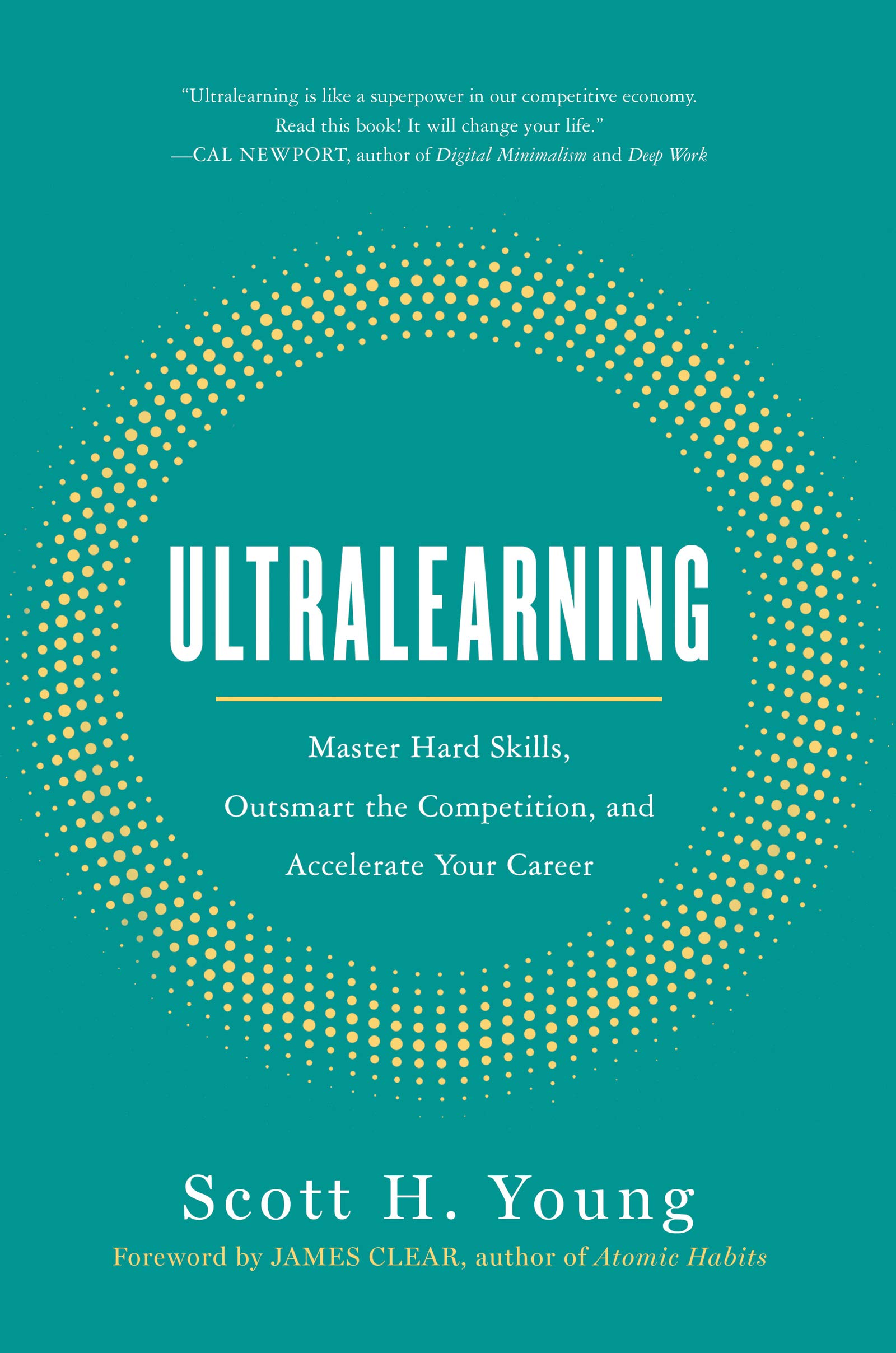
Ultralearning: Master Hard Skills, Outsmart the Competition, and Accelerate Your Career
Scott H. Young
About the Author

Scott H. Young
Questions & Answers
Ultralearning is an intensive, focused approach to learning that emphasizes efficiency and effectiveness. It involves deep immersion in a subject, direct application of knowledge, and rigorous practice. Key principles include metalearning (learning how to learn), focus, directness, drilling, retrieval, feedback, retention, intuition, and experimentation.
It differs from traditional learning methods in several ways:
- Intensiveness: Ultralearning is more intense and time-efficient, often achieving results in a shorter time frame.
- Directness: It emphasizes direct application of knowledge, avoiding abstract or theoretical approaches.
- Focus: It requires a high level of focus and concentration, often through time management techniques.
- Practice: Ultralearning involves deliberate practice, focusing on weaknesses and using drills to improve skills.
- Retrieval: It emphasizes retrieval practice, such as self-testing, to reinforce learning and long-term retention.
- Feedback: It utilizes both outcome and informational feedback to guide learning and make improvements.
- Retention: It employs various strategies to prevent forgetting and ensure long-term retention of knowledge.
Overall, Ultralearning is a more active, targeted, and self-directed approach to learning compared to traditional methods, which often rely on passive absorption of information.
Metalearning enhances the learning process by focusing on the act of learning itself. It involves understanding how knowledge is structured and acquired within a subject, essentially learning how to learn. This approach provides several benefits:
- Mapping the Subject: By understanding the structure of a subject, learners can identify key concepts, facts, and procedures, making it easier to navigate and master the material.
- Identifying Bottlenecks: Recognizing the most challenging aspects of a subject allows learners to focus their efforts on overcoming these obstacles, leading to more efficient learning.
- Long-term Skills: Metalearning builds a set of general learning skills, such as time management, resource gathering, and motivation management, which are valuable for future learning endeavors.
- Deep Understanding: By actively engaging with the material and understanding the underlying principles, learners develop a deeper, more intuitive understanding of the subject, rather than just rote memorization.
- Adaptability: Metalearning encourages learners to adapt their strategies based on feedback and experience, allowing them to continuously improve their learning process.
The key principles of Ultralearning are:
- Metalearning: Understand the subject or skill, its structure, and how to learn it effectively.
- Focus: Prioritize learning and create focused study sessions.
- Directness: Learn by doing and applying the skill in real-world contexts.
- Drill: Identify and improve on your weakest points through targeted practice.
- Retrieval: Test and recall information to reinforce learning.
- Feedback: Seek and process feedback to improve learning strategies.
- Retention: Use techniques like spaced repetition to retain information.
- Intuition: Develop a deeper understanding and make informed decisions.
- Experimentation: Try different methods and adapt your approach based on results.
These principles contribute to effective learning by enhancing focus, engagement, and retention. They encourage active learning, problem-solving, and self-assessment, leading to a deeper understanding and mastery of the subject.
Ultralearning can be adapted to various contexts like personal projects, professional development, and formal education through tailored strategies:
Personal Projects:
- Metalearning: Define the 'why', 'what', and 'how' of your project. Focus on your motivation and the specific knowledge and skills needed.
- Directness: Align learning activities with the real-world application of the skill.
- Drill: Identify and focus on the weakest points to improve overall proficiency.
- Retrieval: Regularly test and recall information to reinforce learning.
- Feedback: Seek constructive feedback to refine your approach.
- Retention: Use techniques like spaced repetition and active recall to retain information.
Professional Development:
- Benchmarking: Understand industry standards and adapt learning goals accordingly.
- Drill: Focus on specific skills that can enhance job performance.
- Experimentation: Try different learning methods to find what works best.
- Intuition: Develop a deeper understanding of the subject matter.
Formal Education:
- Metalearning: Analyze course content and identify the most valuable information.
- Directness: Apply learning directly to real-world scenarios.
- Drill: Use drills to master complex concepts.
- Feedback: Seek feedback from teachers and peers.
- Retention: Use effective memory techniques to retain information.
By incorporating these principles, ultralearning can be effectively applied across different learning environments.
Ultralearning presents significant challenges and benefits. Challenges include the intense mental, emotional, and physical demands, the need for significant time investment, and the potential for frustration and procrastination. Benefits include rapid skill acquisition, career acceleration, personal fulfillment, and expanded horizons.
To overcome obstacles, individuals should:
- Set Clear Goals: Define the "why," "what," and "how" of their learning project to focus efforts.
- Develop Focus: Use techniques like the 10 Percent Rule for research, and strategies like the Direct-Then-Drill Approach for learning.
- Implement Effective Learning Strategies: Employ retrieval practice, spaced repetition, and mnemonics to enhance retention.
- Seek Feedback: Regularly test knowledge and seek constructive feedback to improve learning.
- Maintain Balance: Balance learning with rest and self-care to avoid burnout.
- Experiment and Adapt: Be open to trying new methods and adjusting plans as needed.